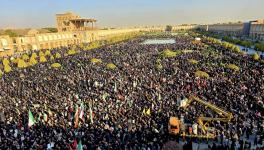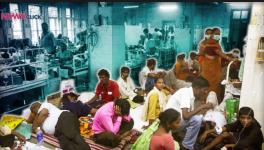Why BJP Wants Meat Banned in Mathura
Representational use only.
In 1902, the prolific British writer HG Wells delivered a philosophical speech titled “The Discovery of the Future” at the Royal Institution in London. Wells is often remembered for his “predictions”, for example, the approximate date when the second world war would begin. In this speech, he envisioned something else with equally significant ramifications—the collapse of the capitalist system. Wells also anticipated that a world of peace and plenty would follow in its wake.
What if someone, following Wells example, attempts a similar extrapolation for India? If anybody could foresee such things, what would they find lies ahead for the “biggest democracy” in the world?
In the absence of Wells, perhaps present-day events can be a map or guide to the future. For example, during recent Janamashtmi celebrations, Uttar Pradesh, Chief Minister Yogi Adityanath announced that his government would ban meat and liquor in Mathura city. He said the meat-sellers and liquor dealers of the area could switch to selling milk. According to his government, a meat and liquor ban would help combine “modern technology” with the cultural and spiritual heritage of the region.
Successive government surveys show that more and more Indians—of all communities—consume more dietary protein from eggs, fish and meat these days. Further, the 2011 Census finds that of Mathura’s population of 4.5 lakh, the Muslims, who are primarily non-vegetarian, are around 18% and Dalits, who consume meat too, make up around 20%. In effect, a meat ban would deprive a significant section of the city's population of their choice of food in their vicinity.
Then some depend on the meat trade, whether or not they consume it. The state government has not offered them any realistic alternate source of livelihood or career. Those left jobless or thrown out of business have no recourse, and most will fail to switch to another profession overnight.
Enforced vegetarianism over an entire city where people of all faiths and traditions reside or come to visit appears to be a “direct attack on people’s right to food of their choice”. It is a unilateral imposition of the views of an influential section within the majority community on everybody else.
Contrary to perceptions, a majority of Indians eat fish, eggs and meat. The most authoritative study confirming this is the People of India Survey, a mammoth enterprise of the Anthropological Survey of India (ASI) released in 1993. The eight-year study steered by ASI director-general Kumar Suresh Singh covered the customs and habits of each Indian community. An army of ASI researchers found that of the 4,635 communities surveyed, nearly 88% are meat-eaters. A 2006 State of the Nation survey conducted by the Centre for the Study of Developing Societies (CSDS) for Hindu-CNN-IBN reinforces the ASI report. It finds that 61% of Indians are non-vegetarian, and only the upper castes—Brahmins in particular—tend to be more vegetarian than meat-eaters. It also revealed that only 31% of Indians are vegetarian. The fifth and latest round of the National Family Health Survey (NFHS-5, 2019-20) shows a similar trend. It found that in 15 of the 18 states surveyed so far, more than 80% of men and women consume eggs, meat and other non-vegetarian items. It found that the dominant higher-caste groups are turning to vegetarianism, bucking the trend in the rest of the population. On the whole, the inclination towards the so-called non-vegetarian diet is growing in 16 of 18 states. The outliers are Rajasthan and Punjab.
Does not the meat ban at Mathura seem incongruous now? HG Wells would undoubtedly have thought so.
It is evident from the data that the Uttar Pradesh government is prioritising the values of a section of social elites while formulating policies for the whole country. Thus, it is puncturing the constitutional guarantee of non-discrimination based on faith, religion, caste, language and ethnicity.
In 2017, the same government had declared “vegetarian only” zones in Vrindavan and Barsana, both in Mathura’s neighbourhood and a part of what is popularly known as "Brijbhoomi".
The ascent of the BJP led by Prime Minister Narendra Modi has opened the floodgates of enforced vegetarianism. Less than two months after the BJP won the 2014 Lok Sabha election, Palitana near Bhavnagar in Gujarat was declared a vegetarian zone. Palitana is an important place of pilgrimage for the Jain community and is known for its mountain that has some 900 temples.
The Jain monks launched a hunger strike demanding that non-vegetarian food, including eggs, should not be sold or stored anywhere in Palitana. The township had a population of 1 lakh at the time. The monks also demanded a ban on the ritual slaughter of animals and the closure of an estimated 260 butcher shops.
The state government bowed to their demands even though 40% of the city’s inhabitants consume non-vegetarian food, including around 25% Muslims and Hindu communities such as Koli, who opposed the demands of the Jain monks.
Palitana, Barsana, Vrindavan and now Mathura...surely the list is not exhaustive yet.
It needs underlining that Uttar Pradesh is not an isolated example. Enforced vegetarianism extended to the prestigious IITs, in 2014. The Union Human Resources Development (HRD) Ministry forwarded a RSS-leaning man’s letter claiming ITT students are taking to “tamsic” behaviour, allegedly by eating meat. According to him, students who take to consuming meat, fish, eggs, garlic or onion while living on-campus at the IITs, are offending their parents, which must be stopped. Even the national carrier Air India had started categorising non-vegetarian food as “Muslim” meals, reminiscent of what happened during days of British rule. At least fourteen states had forcibly excluded eggs from the mid-day meals given to students, an activist with the Right to Food Campaign found in 2018. Nutrition experts emphasise the need to make eggs compulsory in mid-day meals, as they are an inexpensive source of protein.
Mean bans and restrictions create a bizarre situation as most Indians are meat, fish or egg-eaters. There is growing interest in non-vegetarianism, but enforced vegetarianism is getting legitimised. People are right to wonder if this has little to do with faith or culture and everything to do with the growing “assertiveness” about vegetarianism among the elite castes. Perhaps it is also about winning over vote-banks that tend to support vegetarianism as against the national trend.
That said, it is only the upper castes who have reported a 12.4% decadal increase in vegetarianism in India. Assertiveness about “purity” and “acceptability” is the underlying factors, researchers recently reported on the trend. They said the assertiveness also leads to “expressions of disgust and intolerance regarding taboo meats: beef and pork, among other meats, in public spaces, universities, canteens and in expressing religious feelings.”
A significant section of Indians suffers from hunger. It has 131st place on the Global Hunger Index. So, should the government encourage or discourage non-vegetarian food? In the name of protecting culture and faith, people are being told what to eat or not. Food itself is being criminalised. Indeed, it is not something HG Wells would or could have predicted.
The author is an independent journalist. The views are personal.
Get the latest reports & analysis with people's perspective on Protests, movements & deep analytical videos, discussions of the current affairs in your Telegram app. Subscribe to NewsClick's Telegram channel & get Real-Time updates on stories, as they get published on our website.
























